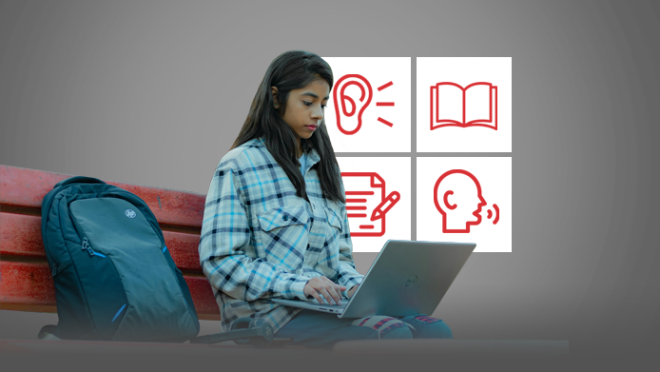How to study smart and not hard for IELTS
How to study smart and not hard for IELTS

The preparation for a test like IELTS can be challenging and overwhelming. Honestly why shouldn’t it be? After all, this exam is designed to measure, assess, and evaluate your English language skills and abilities through Listening, Speaking, Writing and Reading tests.
However instead of seeing it as an obstacle, you should think of it as your chance to improve your abilities. The preparation doesn’t have to be all about the usual advice like studying hard and taking practice tests. Here are some strategies that can give you an edge and make your preparation a little more interesting—and maybe even fun!
- Don’t just study, train your brain to think like you’re taking the tests
This exam doesn’t just test your knowledge but it also evaluates your ability to think and react quickly under pressure. This is particularly important in all the test sections where you might face confusing questions. To counter this, practice thinking in English. This will help you catch subtle details, understand questions better, and respond more naturally without the need to translate in your head. It also helps you understand the questions better and react more naturally and reduce the chances of second-guessing yourself.
- Develop an accent playlist for the Listening Test
The IELTS Listening test includes a range of accents including the British, Australian, and American. This can be challenging for non-native speakers. To make it easy you can try creating an accent playlist with a mix of content such as podcast, news clips, audiobooks, and even music. The goal isn’t just to catch what’s being said but to get used to the rhythm and subtle pronunciation differences. This way it would not just be a dull study session but something binge worthy or a fun musical session. BBC dramas, NPR podcast, or anything that challenges your ear are great choices.
- The Mirror Method: Your secret weapon for the Speaking Test
To polish speaking skills, you can try having a full conversation with yourself with a mirror. Practicing in front of a mirror can help you with your pronunciation and even boost your confidence for speaking test in the IELTS exam. This method will also allow you to adjust any facial expressions or body language that might come up when you’re under stress.

- The Pause-and-Plan technique for the Writing Test
During the writing test portion of the exam your basic instinct might be to start jotting down words as soon as the timer begins. However, if you take a few seconds to breathe and plan your response it can be a game changer. Whether you’re tackling Task 1 or Task 2, use those moments to outline your ideas and thoughts. you’d be surprised how much smoother and coherent your writing will be with just a brief pause.
- Create a ‘Word Zoo’ to tame vocabulary for the Reading Test
Traditional vocabulary lists can be dull but you can make it more engaging as a way to expand your vocabulary. If you associating new words with memorable images or scenarios it will significantly help you in memorization. For example, try visualizing each word with something that sticks in your mind, like linking ‘ambitious’ to a determined mountain climber reaching the peak. This approach helps you recall meanings more easily, especially during the IELTS Reading Test where understanding vocabulary is crucial. It trains your brain to quickly recognize words and grasp context making reading passages less overwhelming and boosting your comprehension skills.
- Use scored feedback wisely in your overall IELTS preparation
Instead of solely relying on practice questions, immerse yourself in real-life scenarios to improve your skills. Engage in reading, writing, speaking, and listening in everyday situations, like having conversations in English, reading articles, or even writing short reflections. Real-life feedback whether from a friend, mentor, or native speaker can be invaluable. This type of feedback helps you understand what you’re doing right and where you need improvement. It’s about turning every interaction into a learning opportunity which will help you build confidence and refine your skills in a practical, impactful way.”
By incorporating these strategies into your prep, you’re not just preparing, you’re leveling up in a way that’s engaging and effective. Remember, the key isn’t just about studying hard but studying smart. So next time you sit down with your test prep materials, give these tips a shot, they might just be the secret weapon you’ve been looking for!


